Please log in to read this in our online viewer!
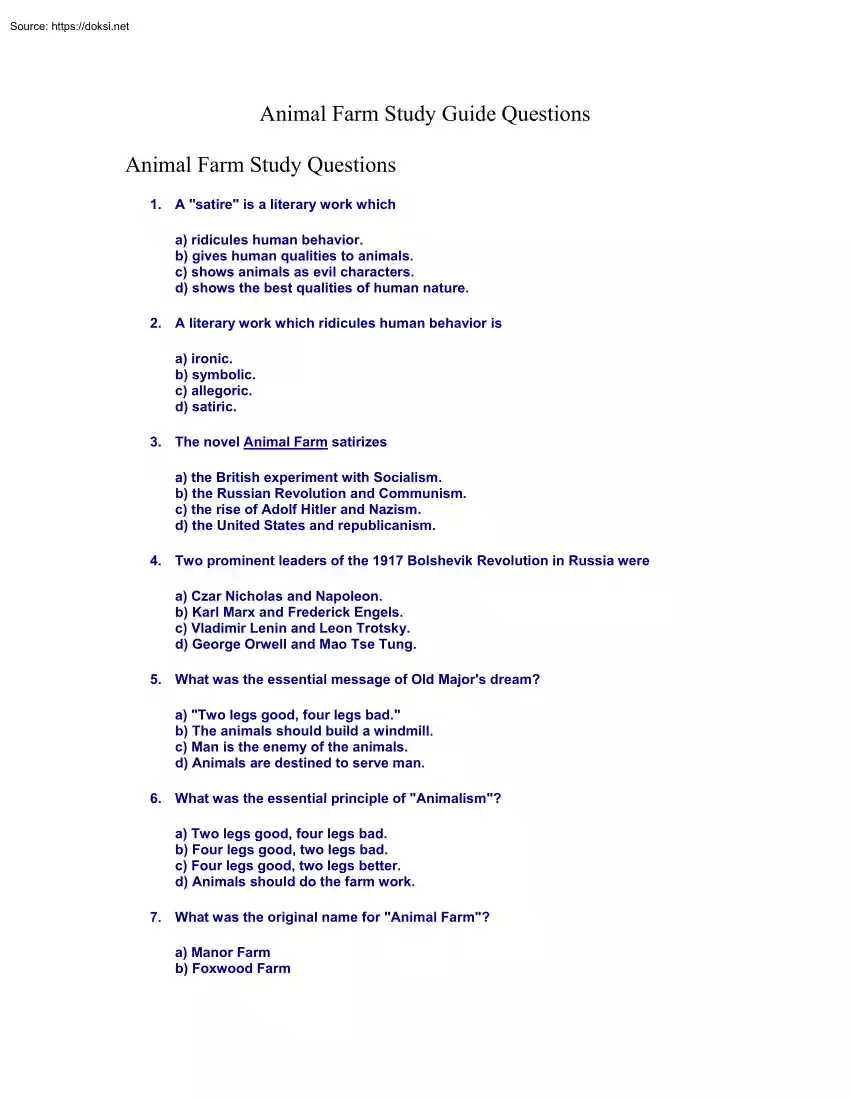
Please log in to read this in our online viewer!
No comments yet. You can be the first!
What did others read after this?
Content extract
Animal Farm Study Guide Questions Animal Farm Study Questions 1. A "satire" is a literary work which a) ridicules human behavior. b) gives human qualities to animals. c) shows animals as evil characters. d) shows the best qualities of human nature. 2. A literary work which ridicules human behavior is a) ironic. b) symbolic. c) allegoric. d) satiric. 3. The novel Animal Farm satirizes a) the British experiment with Socialism. b) the Russian Revolution and Communism. c) the rise of Adolf Hitler and Nazism. d) the United States and republicanism. 4. Two prominent leaders of the 1917 Bolshevik Revolution in Russia were a) Czar Nicholas and Napoleon. b) Karl Marx and Frederick Engels. c) Vladimir Lenin and Leon Trotsky. d) George Orwell and Mao Tse Tung. 5. What was the essential message of Old Major's dream? a) "Two legs good, four legs bad." b) The animals should build a windmill. c) Man is the enemy of the animals. d) Animals are destined to serve man. 6. What
was the essential principle of "Animalism"? a) Two legs good, four legs bad. b) Four legs good, two legs bad. c) Four legs good, two legs better. d) Animals should do the farm work. 7. What was the original name for "Animal Farm"? a) Manor Farm b) Foxwood Farm c) Pinchfield Farm d) the Red Lion 8. "Sugarcandy Mountain" is a satirization of a) Willingdon. b) the farm. c) the outside world. d) heaven. 9. Who received the cow's milk? a) the pigs b) Pincher and Bluebell c) Molly d) no one 10. What happened to Molly? a) She was sold to the glue factory. b) She worked too hard in the construction of the windmill and collapsed. c) She fought bravely in the Battle of the Cowshed. d) She left the farm and again worked for the humans. 11. How would you describe the "Battle of the Cowshed"? a) The humans defeated the animals. b) The animals defeated the humans. c) No one won the battle. d) Napoleon chased Snowball out of the farm yard. 12. How
would you describe the relationship between Snowball and Napoleon? a) They worked together to benefit Animal Farm. b) They disagreed at every point where disagreement was possible. c) They wanted Mr. Jones to return 13. What was Snowball's plan? a) He wanted to sell eggs to the villagers in return for whiskey. b) He wanted to train the dogs to enforce the law. c) He wanted to return the farm to Mr. Jones d) He wanted to build a windmill to ease the animals' work. 14. How did Napoleon react to the animals' agreement to build the windmill? a) He called in the dogs who chased Snowball off the farm. b) He claimed to have a better idea. c) He agreed to go along with the majority. d) He left the farm. 15. Stalin's expulsion of Trotsky from the Communist Party in Russia is satirized by a) b) c) d) the animals' expulsion of the farmer, Mr. Jones the pigs gaining control over the other animals. the death of Old Major. Napoleon's expulsion of Snowball. 16. In
the novel, the historic character Vladimir Lenin is satirized by a) Snowball. b) Old Major. c) Napoleon. d) Mr. Frederick 17. In the novel, the historic character Leon Trotsky is satirized by a) Snowball. b) Old Major. c) Napoleon. d) Mr. Frederick 18. In the novel, the historic character Josef Stalin is satirized by a) Snowball. b) Old Major. c) Napoleon. d) Mr. Frederick 19. Animal Farm is an ALLEGORY of A. the Russian Revolution D. the farmers vs the animals B. propaganda C. the problems with capitalism 20. An allegory usually has A. symbolism to teach a lesson B. characters to stand for ideas C. a hidden meaning D. all of the above E. A & C only 21. A dystopia can be described as a A. a perfect world B. a flawed world C. a world with problems that is seeking to become perfect 22. Which element is NOT a concept of Karl Marx’s socialism? A. Collective Ownership/Means of Production C. Religion is the drug of the Masses B. All People Are Not
Equal D. All Rich are enemies 23. What was the order of power in Russia? A. Lenin, Stalin, Czar Nicholas B. Stalin, Czar Nicholas, Lenin C. Czar Nicholas, Lenin, Stalin 24. The Proletariats are the A. Working class people B. Rich people 25. The Bourgeiosie are the A. Working class people B. Rich people 26. When Lenin came into power, he gave all of the land to the A. Proletariats C. Bourgeiosie B. Government 27. After Lenin tried to reorganize Russia, occurred A. Peaceful agreements C. Civil war B. Propaganda 28. Lenin died before his vision could be achieved His goals were to A. Create a free health care system for all B. Equal the rights of women and men C. Show the importance of capitalism D. all of the above E. A & B only 29. Propaganda is media designed to influence people’s opinions by usually using . A. Humor B. Fear C. Fun Chapter I (1) What is significant about how the animals arrange
themselves as they gather to hear Major? What might this arrangement say about future meetings or events? (2) What does Old Major imagine that life could be like for the animals on Manor Farm? (3) Who is Mr. Jones? What events bring on a rebellion against him? (4) According to Major, what is the cause of all animals’ problems? (5) What motto does Major give the animals? (6) What are the commandments Major gives the animals? Can you think of ways each of them could be considered a vice? (7) From what point of view is the story told? What does this point of view let readers know about the characters? (8) Write 3 sentences summarizing chapter one Chapter II (1) After Major’s death, what happens to the idea of rebelling against man? (2) What does Sugarcandy Mountain stand for? Why do some of the animals want to believe the raven’s stories about the palace? (3) Why don’t the pigs like the pet raven Moses’ stories Sugarcandy Mountain? (4) What causes the animals to finally
rebel against Mr. Jones and his four farmhands? (5) When the humans have been chased from the farm, what do the animals do? (6) What do the animals do about the farmhouse? (7) What have Snowball, Napoleon, and some other pigs learned to do? How might they have an advantage over the other animals? (8) From what point of view is the story told? What does this point of view let readers know about the character? Chapter III and IV (1)How well does the farm run under the animals’ rule at first? How do the animals fell? (2)Why does Snowball reduce the seven Commandments to “Four legs goods, two legs bad”? (3)What is ironic about Squealer’s explanation that the pigs need the milk and apples because they are the “brainworkers” for the farm? (4)What are Napoleon’s ideas about education? (5)How is Squealer able to convince the other animals to accept whatever Napoleon decides? (6)What causes the Battle of the Cowshed? Who takes part in it, and who wins? (1) What is
Snowball’s role in the Battle of the Cowsheds? Why isn’t Napoleon’s role in the battle explained? (8)What is the significance of the gun’s placement at the foot of the flagpole? Chapter V (1) Why does Mollie run away from the farm? (2) What changes have been made in the weekly meetings over the last year? (3) Explain the wind mill controversy from Snowball’s point of view. (4) Explain the windmill controversy from Napoleon’s point of view. (5) What changes does Napoleon make after his dogs chase Snowball off the farm? (6) Why don’t the other animals protest Napoleon’s decisions? (7) Note how the animals now arrange themselves when they enter the barn to receive their orders, as compared with the description in Chapter 1. (8) What is the importance of the dogs’ accompanying Squealer when he comes to talk to the animals? Chapters VI and VII (1) How much work are the animals doing? (2)Why does Napoleon decide to engage in trade with the neighboring farms?
(3)How do animals react? How does Squealer convince them that the trade is okay? (4)How is the windmill destroyed? Why does Napoleon blame Snowball? (5)Why does Napoleon insist the windmill must be rebuild immediately? (6)Why does Napoleon order that the hens’ eggs be sold? (7)How does Napoleon react when the hens rebel against his orders? (8)How does Boxer try to use his reason when Squealer says there is “proof” that Snowball was Jones’s agent? Why does Boxer eventually say, “Napoleon is right”? (9)Why does Napoleon revive the threat of the farm being sabotaged by Snowball? (10)Explain why the animals confessed to being traitors. Or is there any explanation? (11)What purpose might Napoleon have for conducting public executions? How does his decision add to the characterization of him? (12)Why does Napoleon order the animals to stop singing “Beast of England?” Chapter VIII and IX (1)What purpose is served by the production figures Squealer reads to the animals?
(2)What does Squealers name tell you about him? what is his function in the story? (3)How is Napoleon becoming more and more like a typical dictator? (4)Describe the sale of the stack of lumber. How does Napoleon outwit himself? (5)Why do the animals attack Fredericks and his men at the windmill? How will their “victory” actually cost them more labor? (6)What makes the battle against Frederick’s men different from the Battle of the Cowshed? (7)Why do the men blow up the windmill? (8)The animals celebrate a victory, but at what cost? (9)Describe the whiskey incident. Why would Orwell make this scene somewhat humorous? (10)Why are the animals so easily fooled, even when they find Squealer with a ladder and white pain besides the barn at night? (11)What is happening to Boxer? (12)What are living conditions like for all of the animals except the pig and dogs? (13)Why does Napoleon allow Moses to return an to tell his stories about Sugarcandy Mountain? (14)What happens to Boxer? How
do the animals accept it? Why does this fate seem especially cruel? (15)Of what kind of person does Benjamin remind you? Give some examples. What is your opinion of such people? What makes people behave this way? Explain the irony of Napoleon orders and “Spontaneous Demonstration” Chapter X (1)What changes have the years brought to the farm? (2)How does Orwell make fun of bureaucracy? (3)How do the animals now feel about their social order, their farm? What message about human nature might Orwell be expensive? (4)What drastic actions do the pigs use to shatter the animals’ complacency? (5)All seven commandments are erased. What is the new commandment and how has it been true from beginning? (6)At the conference with neighboring farmers, what changes does Napoleon point out? (7)What happens to the pigs’ appearance? (8)How does having Napoleon declare that Animal Farm will now be called Manor Farm reinforce Orwell’s message?
was the essential principle of "Animalism"? a) Two legs good, four legs bad. b) Four legs good, two legs bad. c) Four legs good, two legs better. d) Animals should do the farm work. 7. What was the original name for "Animal Farm"? a) Manor Farm b) Foxwood Farm c) Pinchfield Farm d) the Red Lion 8. "Sugarcandy Mountain" is a satirization of a) Willingdon. b) the farm. c) the outside world. d) heaven. 9. Who received the cow's milk? a) the pigs b) Pincher and Bluebell c) Molly d) no one 10. What happened to Molly? a) She was sold to the glue factory. b) She worked too hard in the construction of the windmill and collapsed. c) She fought bravely in the Battle of the Cowshed. d) She left the farm and again worked for the humans. 11. How would you describe the "Battle of the Cowshed"? a) The humans defeated the animals. b) The animals defeated the humans. c) No one won the battle. d) Napoleon chased Snowball out of the farm yard. 12. How
would you describe the relationship between Snowball and Napoleon? a) They worked together to benefit Animal Farm. b) They disagreed at every point where disagreement was possible. c) They wanted Mr. Jones to return 13. What was Snowball's plan? a) He wanted to sell eggs to the villagers in return for whiskey. b) He wanted to train the dogs to enforce the law. c) He wanted to return the farm to Mr. Jones d) He wanted to build a windmill to ease the animals' work. 14. How did Napoleon react to the animals' agreement to build the windmill? a) He called in the dogs who chased Snowball off the farm. b) He claimed to have a better idea. c) He agreed to go along with the majority. d) He left the farm. 15. Stalin's expulsion of Trotsky from the Communist Party in Russia is satirized by a) b) c) d) the animals' expulsion of the farmer, Mr. Jones the pigs gaining control over the other animals. the death of Old Major. Napoleon's expulsion of Snowball. 16. In
the novel, the historic character Vladimir Lenin is satirized by a) Snowball. b) Old Major. c) Napoleon. d) Mr. Frederick 17. In the novel, the historic character Leon Trotsky is satirized by a) Snowball. b) Old Major. c) Napoleon. d) Mr. Frederick 18. In the novel, the historic character Josef Stalin is satirized by a) Snowball. b) Old Major. c) Napoleon. d) Mr. Frederick 19. Animal Farm is an ALLEGORY of A. the Russian Revolution D. the farmers vs the animals B. propaganda C. the problems with capitalism 20. An allegory usually has A. symbolism to teach a lesson B. characters to stand for ideas C. a hidden meaning D. all of the above E. A & C only 21. A dystopia can be described as a A. a perfect world B. a flawed world C. a world with problems that is seeking to become perfect 22. Which element is NOT a concept of Karl Marx’s socialism? A. Collective Ownership/Means of Production C. Religion is the drug of the Masses B. All People Are Not
Equal D. All Rich are enemies 23. What was the order of power in Russia? A. Lenin, Stalin, Czar Nicholas B. Stalin, Czar Nicholas, Lenin C. Czar Nicholas, Lenin, Stalin 24. The Proletariats are the A. Working class people B. Rich people 25. The Bourgeiosie are the A. Working class people B. Rich people 26. When Lenin came into power, he gave all of the land to the A. Proletariats C. Bourgeiosie B. Government 27. After Lenin tried to reorganize Russia, occurred A. Peaceful agreements C. Civil war B. Propaganda 28. Lenin died before his vision could be achieved His goals were to A. Create a free health care system for all B. Equal the rights of women and men C. Show the importance of capitalism D. all of the above E. A & B only 29. Propaganda is media designed to influence people’s opinions by usually using . A. Humor B. Fear C. Fun Chapter I (1) What is significant about how the animals arrange
themselves as they gather to hear Major? What might this arrangement say about future meetings or events? (2) What does Old Major imagine that life could be like for the animals on Manor Farm? (3) Who is Mr. Jones? What events bring on a rebellion against him? (4) According to Major, what is the cause of all animals’ problems? (5) What motto does Major give the animals? (6) What are the commandments Major gives the animals? Can you think of ways each of them could be considered a vice? (7) From what point of view is the story told? What does this point of view let readers know about the characters? (8) Write 3 sentences summarizing chapter one Chapter II (1) After Major’s death, what happens to the idea of rebelling against man? (2) What does Sugarcandy Mountain stand for? Why do some of the animals want to believe the raven’s stories about the palace? (3) Why don’t the pigs like the pet raven Moses’ stories Sugarcandy Mountain? (4) What causes the animals to finally
rebel against Mr. Jones and his four farmhands? (5) When the humans have been chased from the farm, what do the animals do? (6) What do the animals do about the farmhouse? (7) What have Snowball, Napoleon, and some other pigs learned to do? How might they have an advantage over the other animals? (8) From what point of view is the story told? What does this point of view let readers know about the character? Chapter III and IV (1)How well does the farm run under the animals’ rule at first? How do the animals fell? (2)Why does Snowball reduce the seven Commandments to “Four legs goods, two legs bad”? (3)What is ironic about Squealer’s explanation that the pigs need the milk and apples because they are the “brainworkers” for the farm? (4)What are Napoleon’s ideas about education? (5)How is Squealer able to convince the other animals to accept whatever Napoleon decides? (6)What causes the Battle of the Cowshed? Who takes part in it, and who wins? (1) What is
Snowball’s role in the Battle of the Cowsheds? Why isn’t Napoleon’s role in the battle explained? (8)What is the significance of the gun’s placement at the foot of the flagpole? Chapter V (1) Why does Mollie run away from the farm? (2) What changes have been made in the weekly meetings over the last year? (3) Explain the wind mill controversy from Snowball’s point of view. (4) Explain the windmill controversy from Napoleon’s point of view. (5) What changes does Napoleon make after his dogs chase Snowball off the farm? (6) Why don’t the other animals protest Napoleon’s decisions? (7) Note how the animals now arrange themselves when they enter the barn to receive their orders, as compared with the description in Chapter 1. (8) What is the importance of the dogs’ accompanying Squealer when he comes to talk to the animals? Chapters VI and VII (1) How much work are the animals doing? (2)Why does Napoleon decide to engage in trade with the neighboring farms?
(3)How do animals react? How does Squealer convince them that the trade is okay? (4)How is the windmill destroyed? Why does Napoleon blame Snowball? (5)Why does Napoleon insist the windmill must be rebuild immediately? (6)Why does Napoleon order that the hens’ eggs be sold? (7)How does Napoleon react when the hens rebel against his orders? (8)How does Boxer try to use his reason when Squealer says there is “proof” that Snowball was Jones’s agent? Why does Boxer eventually say, “Napoleon is right”? (9)Why does Napoleon revive the threat of the farm being sabotaged by Snowball? (10)Explain why the animals confessed to being traitors. Or is there any explanation? (11)What purpose might Napoleon have for conducting public executions? How does his decision add to the characterization of him? (12)Why does Napoleon order the animals to stop singing “Beast of England?” Chapter VIII and IX (1)What purpose is served by the production figures Squealer reads to the animals?
(2)What does Squealers name tell you about him? what is his function in the story? (3)How is Napoleon becoming more and more like a typical dictator? (4)Describe the sale of the stack of lumber. How does Napoleon outwit himself? (5)Why do the animals attack Fredericks and his men at the windmill? How will their “victory” actually cost them more labor? (6)What makes the battle against Frederick’s men different from the Battle of the Cowshed? (7)Why do the men blow up the windmill? (8)The animals celebrate a victory, but at what cost? (9)Describe the whiskey incident. Why would Orwell make this scene somewhat humorous? (10)Why are the animals so easily fooled, even when they find Squealer with a ladder and white pain besides the barn at night? (11)What is happening to Boxer? (12)What are living conditions like for all of the animals except the pig and dogs? (13)Why does Napoleon allow Moses to return an to tell his stories about Sugarcandy Mountain? (14)What happens to Boxer? How
do the animals accept it? Why does this fate seem especially cruel? (15)Of what kind of person does Benjamin remind you? Give some examples. What is your opinion of such people? What makes people behave this way? Explain the irony of Napoleon orders and “Spontaneous Demonstration” Chapter X (1)What changes have the years brought to the farm? (2)How does Orwell make fun of bureaucracy? (3)How do the animals now feel about their social order, their farm? What message about human nature might Orwell be expensive? (4)What drastic actions do the pigs use to shatter the animals’ complacency? (5)All seven commandments are erased. What is the new commandment and how has it been true from beginning? (6)At the conference with neighboring farmers, what changes does Napoleon point out? (7)What happens to the pigs’ appearance? (8)How does having Napoleon declare that Animal Farm will now be called Manor Farm reinforce Orwell’s message?
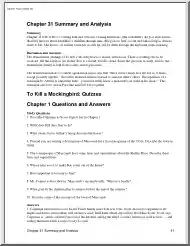
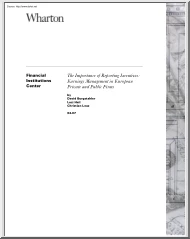
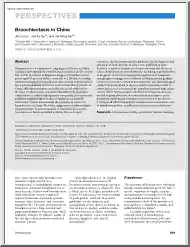
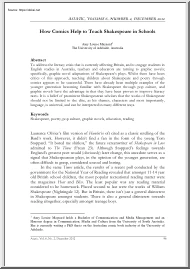
 Just like you draw up a plan when you’re going to war, building a house, or even going on vacation, you need to draw up a plan for your business. This tutorial will help you to clearly see where you are and make it possible to understand where you’re going.
Just like you draw up a plan when you’re going to war, building a house, or even going on vacation, you need to draw up a plan for your business. This tutorial will help you to clearly see where you are and make it possible to understand where you’re going.